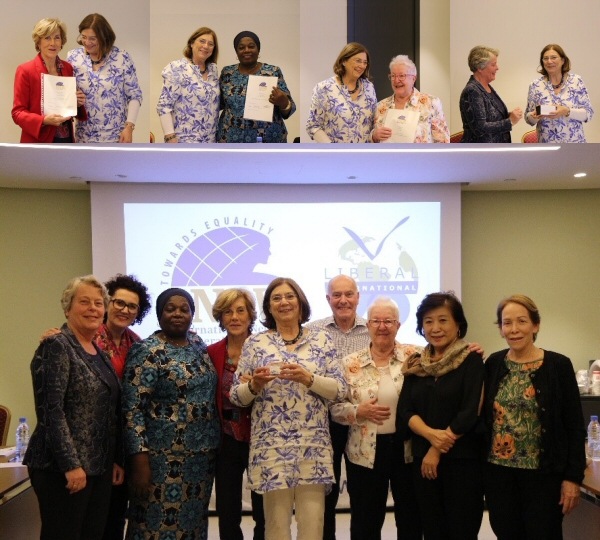Friday 15th of March 2019
4.30 pm- 6pm at
Church Centre 8th floor
Event Overview: Transforming Social Protection: Can the Istanbul Convention Help? The Council of Europe’s Convention on Preventing and Combating Violence against Women and Domestic Violence, also known as the Istanbul Convention, is the most comprehensive international legislation on the issue of violence against women. The event will therefore explore the relevance of the Convention as a global framework to support social protection systems at the national level. Key experts from the Council of Europe, the International Network of Liberal Women and the National Democratic Institute will be invited to present their views and discuss best practices from across states which have already ratified the Convention.
Social protection systems have the potential to transform social and economic gender dynamics. However, to achieve this end, they must be designed taking into account the different types of risks and vulnerabilities affecting women in particular, such as violence or social marginalization. As the most comprehensive international treaty on the issue of violence against women, the Istanbul Convention can serve as an effective tool to help nation states to develop policies and mechanisms to overcome this challenge. One of the concrete outcomes of the event will be to generate international support for the extension of the Istanbul Convention beyond the borders of Europe, building an important advocacy platform towards the empowerment of women and girls around the world.
Participators of the Side Event
Moderator: Jayanthi Devi Balaguru Parti Gerakan Rakyat, Malaysia Jayanthi Devi Balaguru is currently serving as President of International Network of Liberal Women (INLW), the Chair of the Council of Asian Liberal and Democrats (CALD) Women’s Caucus. She is a lawyer, and an active member of Parti Gerakan Rakyat in Malaysia. Previously, she has served as an elected member of the Central Committee Member of the party, Wanita Gerakan Chairman and Chairman of the Central Environment Bureau. Ms. Balaguru has degrees from the University of Staffordshire and the University of Malaya and regularly conducts programs on women’s empowerment.
SPEAKERS:
Dubravka Šimonovic, Croatia UN Special Rapporteur on violence against women, its causes and consequences Appointed as United Nations Special Rapporteur in June 2015 by the UN Human Rights Council. Started her tenure on 1 August 2015. Was a member of the CEDAW Committee between 2002 and 2014 and served as its Chairperson in 2007 and 2008. She was the Chairperson of the UN Commission on the Status of Women between 2001 and
2002 and also worked as a member of the UNIFEM Consultative Committee. At the regional level she was the Chair and Vice Chair of the Council of Europe’s Task Force to combat violence against women, including domestic violence in 2006 and 2007. Between 2008 and 2010, she co-chaired the Ad hoc Committee (CAHVIO) that elaborated the Convention on Preventing and Combating Violence against Women and Domestic Violence. Ms. Šimonović holds a PhD in family law from the University of Zagreb. She is the author of several books and articles on women’s rights and violence against women.
Annemie Neyts-Uyttebroeck LI President of Honour, OpenVLD, Belgium Annemie Neyts-Uyttebroeck has had a long-standing career in European and international politics, serving as president of Liberal International between 2000-2005. Ms Neyts was three-times elected as a Member of the European Parliament and sat on the Committee on Foreign Affairs. In 2005 she was elected president of the European Liberal Democrat and Reform Party (now Alliance of Liberals and Democrats for Europe Party) and is today a Belgian Minster of State. The liberal contribution Annemie Neyts has made to international politics has been recognized in Belgium, with the awarding of the highest order of Belgium, the Order of Leopold, and internationally with her appointment as a Knight of the French Légion d’honneur.
Feride Acar, Turkey President of the Group of Experts on Action Against Violence Against Women and Domestic Violence (GREVIO) Professor Emeritus of Political Science and Public Administration at Middle East Technical University (METU) in Ankara, Turkey. She is a former Chairperson and member of the UN Committee on the Elimination of Discrimination Against Women (CEDAW). Prof. Acar has been active in the international women’s human rights and gender equality arena, either as an independent expert or representing Turkey in global and regional events. She has taken part in the negotiations, drafting and/or monitoring the implementation of several fundamental international instruments on women’s rights and gender equality (CEDAW, Beijing Platform for Action, CEDAW Optional Protocol, Istanbul Convention). She has organized and carried out ‘trainings’ on women’s rights and gender equality in many countries.
Bineta Diop, Senegal (NOT CONFIRMED) Africa Union Special Envoy on Women Founder and President of Femmes Africa Solidarité (FAS). She has led numerous peacebuilding programmes, including a women, peace and security initiative that resulted in the creation of a strong West African women’s movement, the Mano River Women’s Peace Network, which was awarded the United Nations General Assembly Prize in Human Rights in 2003. She has facilitated peace talks among women, particularly during the Burundi and the Democratic Republic of the Congo peace negotiations. Ms. Diop played an instrumental role in achieving gender parity within the African Union Commission in 2003, which culminated in the election of five female Commissioners, and the adoption of the African Charter on Women and Peoples’ Rights (Maputo Protocol) and the Solemn Declaration on Gender Equality in Africa. Ms. Diop has received numerous honours and awards and in 2011 was named by TIME magazine as one of the 100 Most Influential People in the World.
This year the UN CSW was set with the title “Social protection systems, access to public services and sustainable infrastructure for gender equality and the empowerment of women and girls”
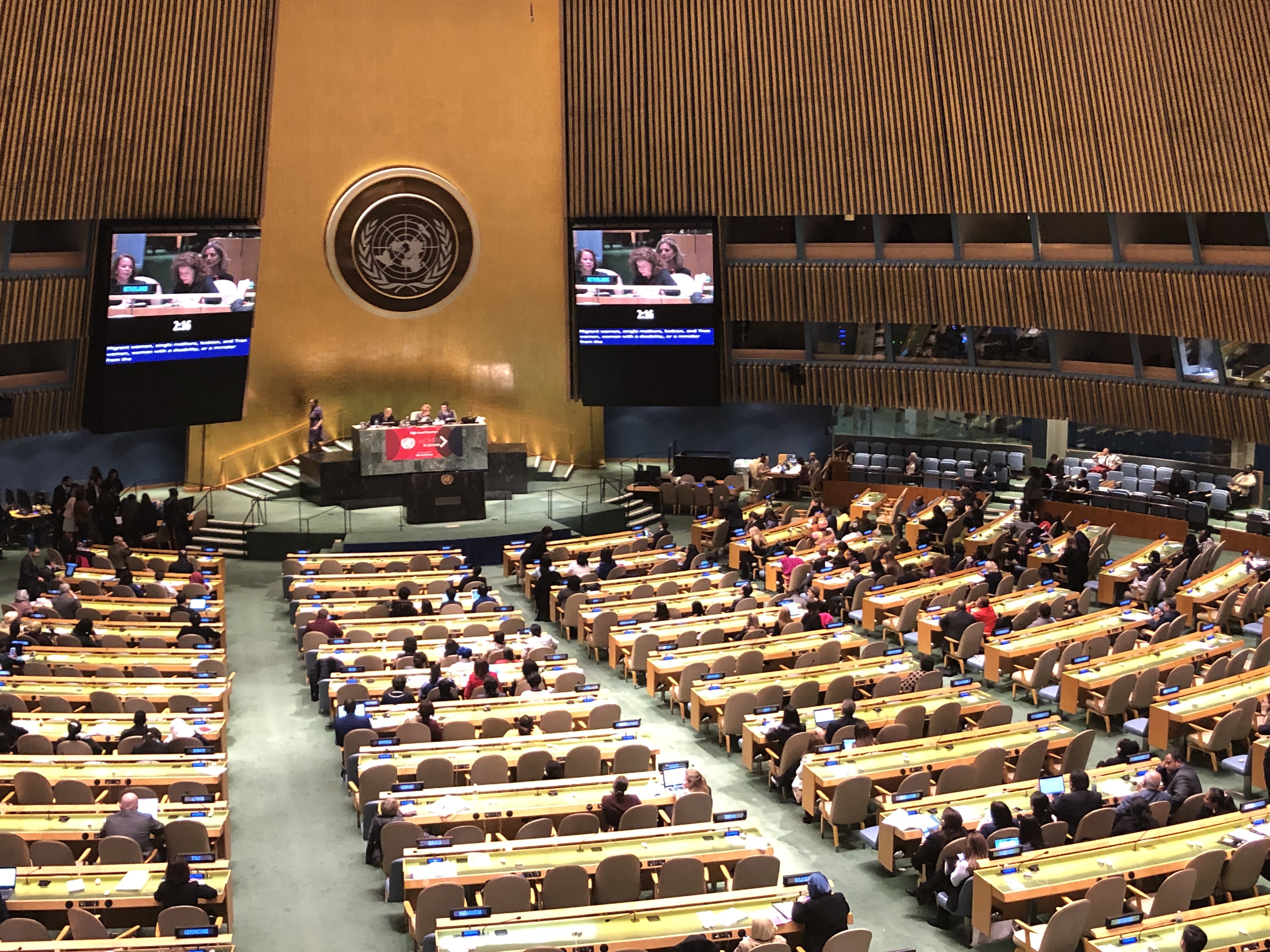
Several members of our INLW board were present. Our new president Jayanthi Balaguri, Margaret de Vos, Lysbeth van Valkenburg, Khadija El Morabit, Maysing Yang and Ruth Richardson were present during the opening ceremony, as well as Joaquima Alemany. Many persons from African and Asian countries were again not able to get visa’s to enter USA, like Awa Gueye our newly co-opted Vice President from Senagal for Sub Sahara Africa who had worked hard to get a big INLW delegation from Senegal and Mali to visit the CSW, but she herself received her visum just after the end of CSW! You wonder if the UN should stay in New York if people from around the world are not able to visit the UN because of US visum problems! We were able to welcome some new members though during CSW.
The opening started with a moment of silence for the lives lost in the tragic plane crash in Ethiopia.
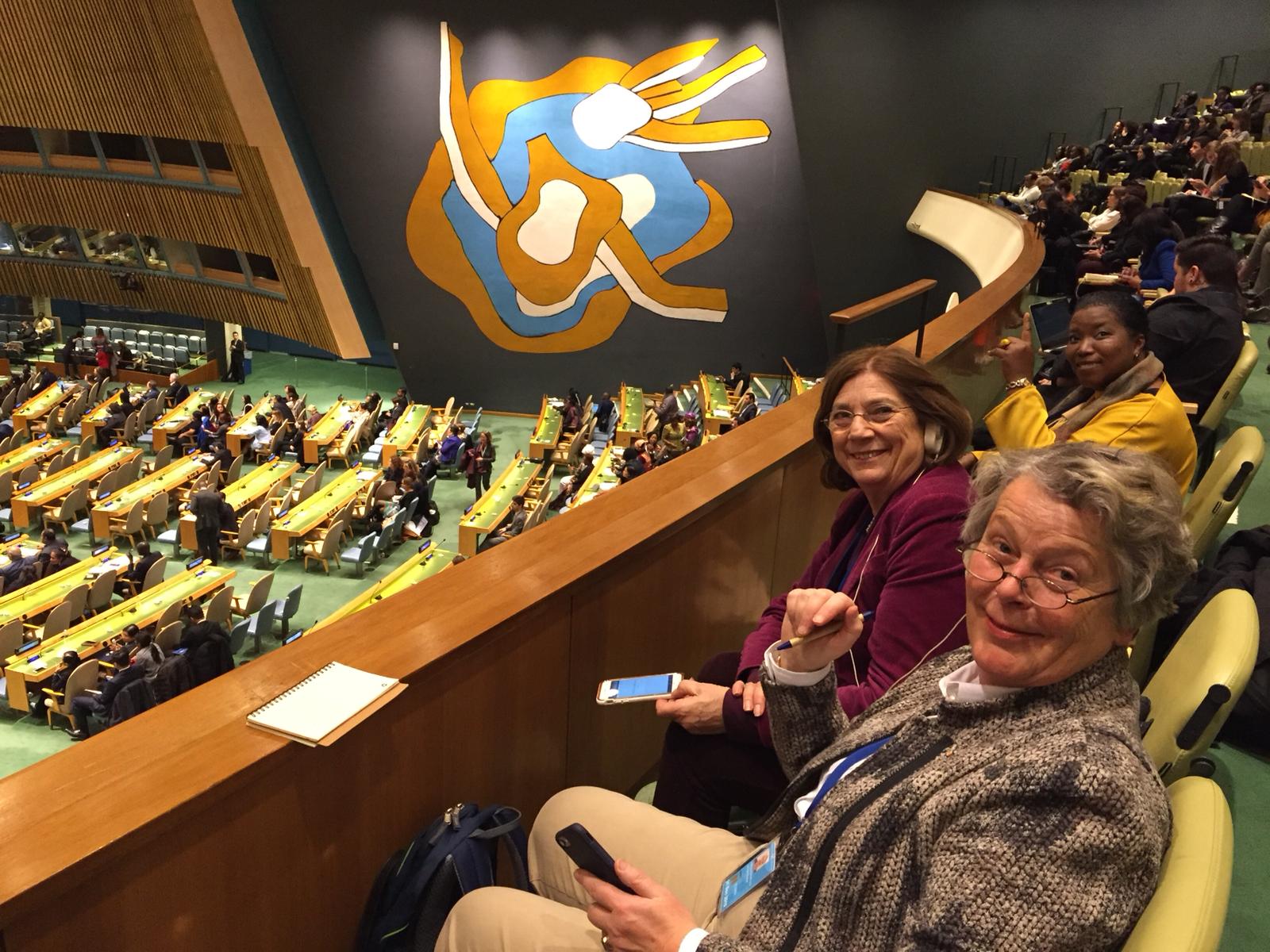
Ambassador Geraldine Byrne Nason (from Ireland) CSW63 Chair, gave us some good statements on the theme. “Changing laws goes hand in hand with changing gender norms, we are all responsible for women’s empowerment, and all responsible for making our societies more equal: to create positive change and share policies.
Increasing the financial capability of girls as well as awareness of their rights, helps them take advantage of economic opportunities. Over 100k girls will receive financial educations through life skills programs.
Women are leading the way in efforts to build resilience and adapt to the impact of climate change. They pick up the pieces when families are forcibly displaced or struggle to recover from conflict”.
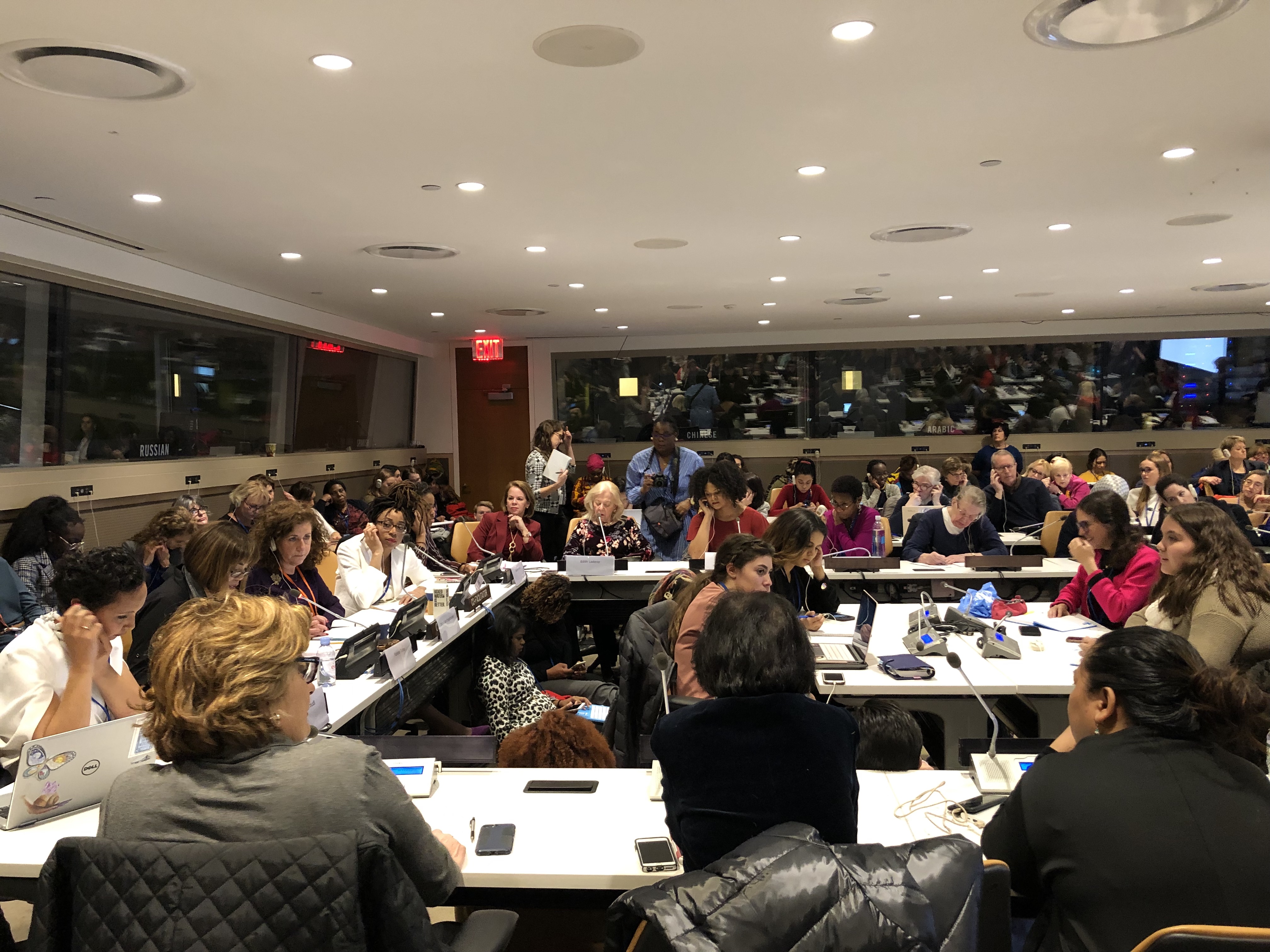
“Without a good basic structure woman won’t get any good position and rights. Laws, education, health and transport are important. In India we can see the result with more education there are more women in higher positions”. As Mrs. Nason stated in her opening of the 63rd CSW.
After the general opening all the various workshops and parallel events started.
The Monday morning session organised by Liberal International and INLW took place even before the official opening and had the title:
“Gov Ids My number, So Track Me Maybe?”,
do technology-based systems prevent long-term risk to democratic integrity? Discussion on the social protection implications of introducing digital IDS for the empowerment of women.
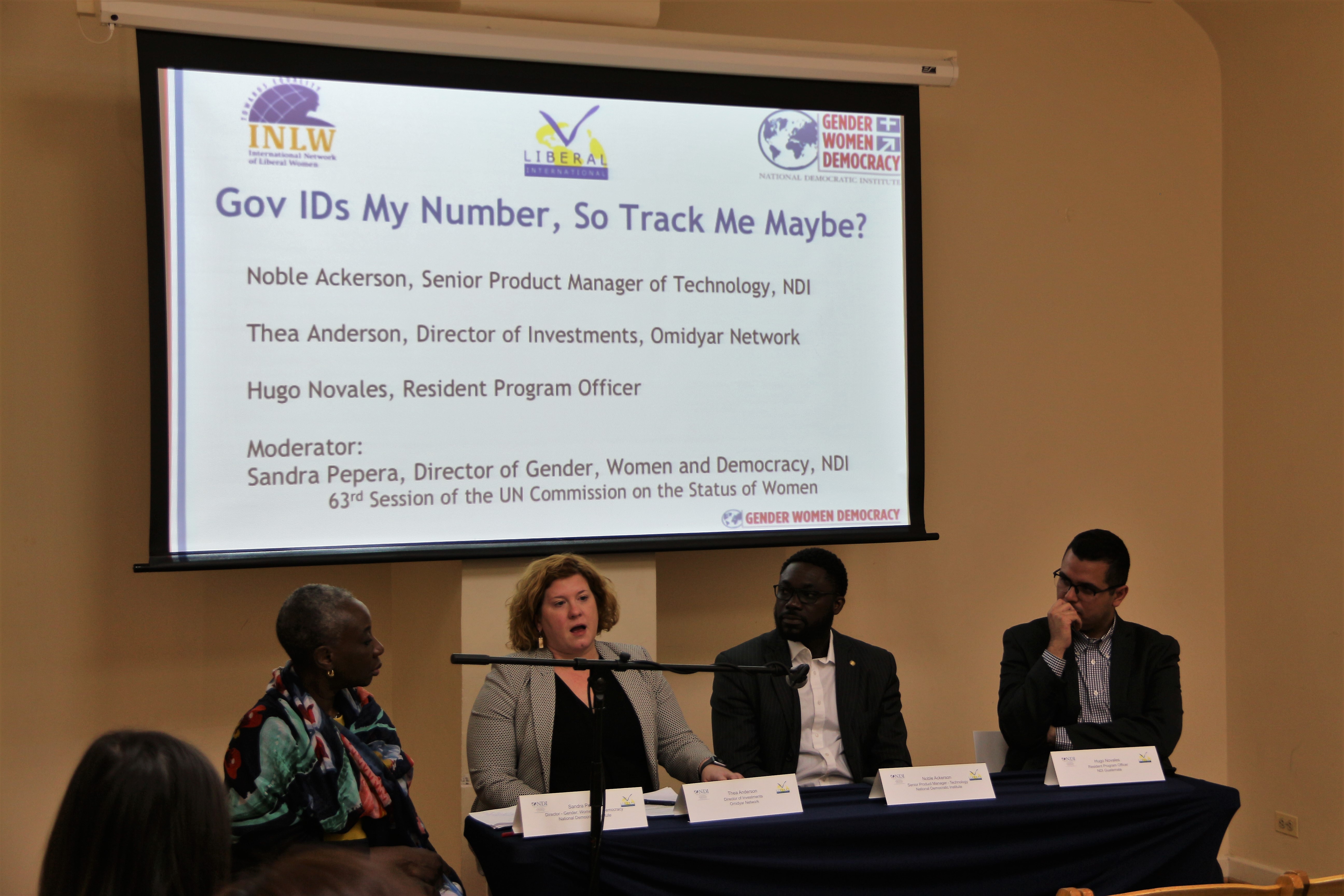
Sandra Pepera, director for Gender, Women and Democracy, NDI, was moderator during the session. Participants: Noble Ackerson, senior product manager, Technology, Thea Anderson, director , Omidyar Network and Hugo Novales, regional Program officer, NDI. They gave their different views on technological development for women and girls.
Digitization can do a lot for mankind as was concluded. Before we all became digital over a billion people had no access to a passport or ID. The poorer they were the more rare the opportunities of getting any ID. If you are without an ID how can you get money or a house for instance. It also implies that you are unable to get security or health care. At the moment 55% of the world population has no digital ID.
This is one of the most important issues for any government to organize as soon as possible.75% of our health care is linked to our ID, 11% has direct digital voting capacity. Digital ID gives efficiency but also many possibilities.
In Pakistan in 2009 14 million women had a digital ID to health care, at the elections 11 million were absent during the voting for parliament. Possibly because they were afraid to vote.
75% of our health care is linked to our ID, 11% has direct digital voting capacity. Digital ID gives efficiency but also many possibilities.
In Pakistan in 2009 14 million women had a digital ID to health care, at the elections 11 million were absent during the voting for parliament. Possibly because they were afraid to vote.
Thea Anderson concludes that it is quite a step to a digital world which also has to include privacy, choice and security. At the moment 148 countries are working with a digital system.
Noble Ackerson, from analogy to digital gives control, privacy and security as advantages. But governements often want to know a lot of data and are not prepared to give people insight in all they know. So we all have to be alert what we want to share, make our own choice.
Hugo Novales, with an ID you can show that you exist. It is not how to use data but also what is a government doing with the data when digitizing. Also who is the owner of the data? Where are our data stored?
Why do we want an ID? It is linked to social payment, so it is useful for our finances and important for education, but for any digital use you need electricity.
Regulation of data is important, there is a enormous amount of big data today.
In some countries, If you want to vote you have to register:
2007 43 million women went to vote
2011 50.9 women went to vote
2015 53 women went to vote because they were able to register because they possessed an ID.
In many countries banks are owned by the government so one must be alert to share ones ID and protect ones privacy, one must train people on all the risks.
Laws must be made to make it safer: data protection laws. Special laws have to be made for Google. Before you are using data, you always have to ask the owner. Digitalisation is a tool, but governments must be trustworthy. How long to retain information and at what cost. We must be careful and know what we are doing with our ID and data!
The panel gave us an interesting insight of all challenges and risks that are part of this new digital world.
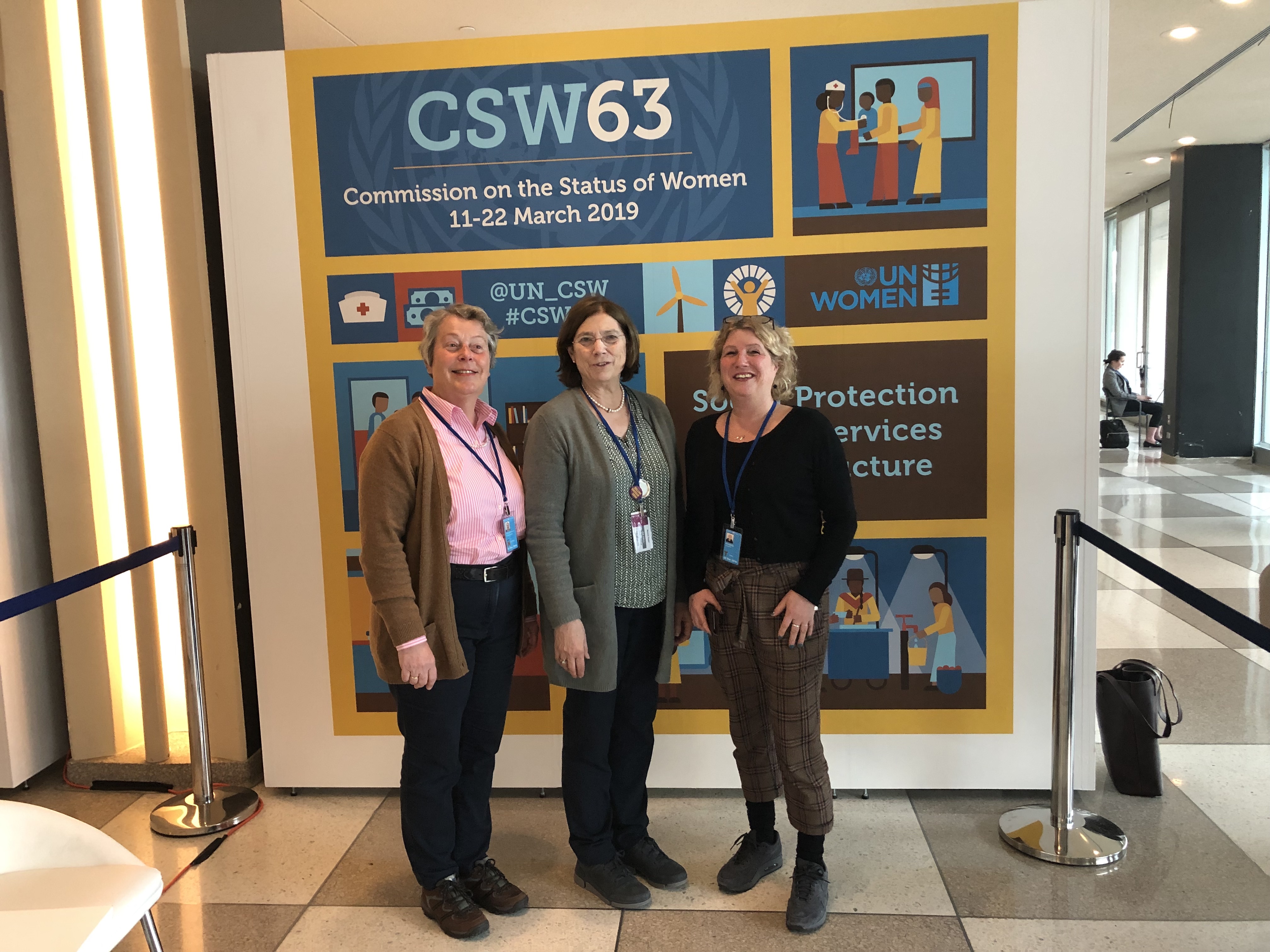
Another interesting panel discussion was about “Women in Media”.
Media informs, influences and shapes the world we live in. Journalism exists to serve the public and represent society. But unfortunately, women and minorities remain largely underrepresented. Both in front of the camera as well as in positions of power.
We see that in most media the men are the experts that are asked to give information.
Women have to make connections to form a network and thus become more involved. To show themselves on tv and other media.
But also in governments some countries show very few women in the decision making positions.
The start is in education; schoolbooks have to be updated with more examples of women in photo’s showing them at work and showing their achievements.
Women have to protest to committees or penal judges where there are only men holding the seats. They have to speak out to get more diversity.
We need more men to help us to get this done. Many choices are made by white men, they need convincing that any committee needs diversity to deliver good work.
In some parts of the world, safety is also a cause for women not to participate in official positions.
In the new digital world girls and women are facing harassment, so also in this medium safe spaces on-line are important.
Many choices for positions in government or other important places are made by people who tend to choose persons who resemble themselves and thus limiting possibilities for more diversity.
One speaker, a reporter working for one of the international bureau’s, was the first woman reporter sent to war zones in 1972. As she did this very well she was sent to other war areas such as Afghanistan, Northern-Ireland, Ruwanda, Bosnia and Israel. Her career is an example for the progress that has been made. But in media and boardrooms men are still uppermost present: there is a world to win for girls to make their mark in these positions.
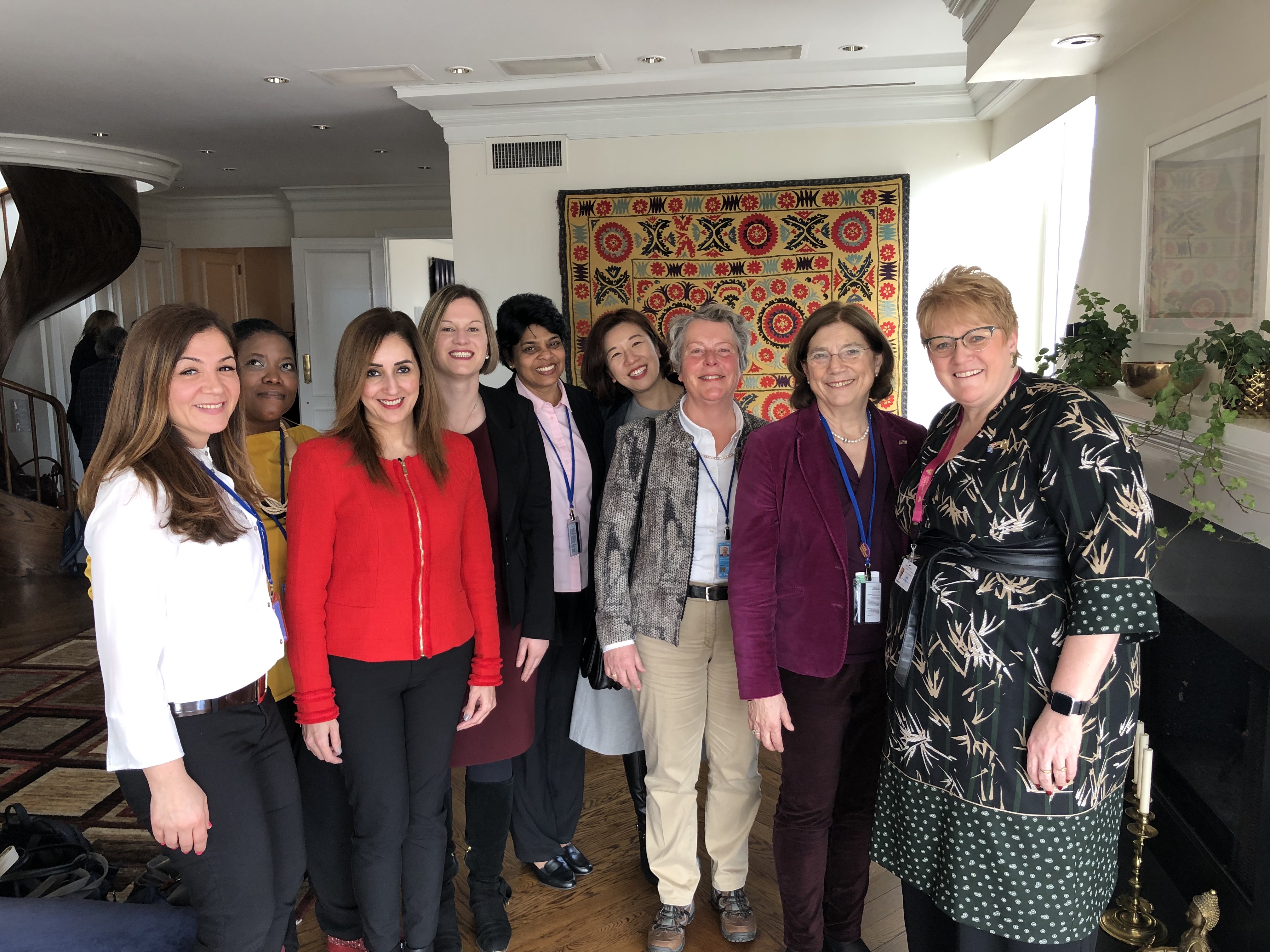
During the first week we also paid a visit to Minister Trine Skei Grande, Minister of Culture & Gender equality, Venstre Norway. She told us about the progress that has been made for the position of women in Norway. Wealth is especially increased because women are working.
In the political parties there are 4 women party leaders.
Maysing Yang told us about the difficulties in Taiwan, the law has to be changed first for women to get more possibilities such as ownership of their own business.
Khadija el Morabit could tell us that in Morocco on paper things are equal but in reality there are many problems for women and girls to get into important positions.
Jayanthi Balaguru, president of INLW, gave as a view about the problem in her country Malaysia where the enormous difference of culture and religion makes it difficult to reach any equality. But with support from all over the world the balance will be reached.
Minister Skei Grande told us that in Norway women’s rights were an issue but it is improving. The best way to get result is in education, but also health issues such as safe abortion are vital for progress.
At the moment there is a discussion about maternity leave. The government wants to divide it between men and women, so 1/3 for the women, 1/3 for the man and 1/3 they can devide themselves.
This gave huge problems with the women who are not really
prepared to share or give such a privilige to the man. So even in Norway there
is still a world to win.
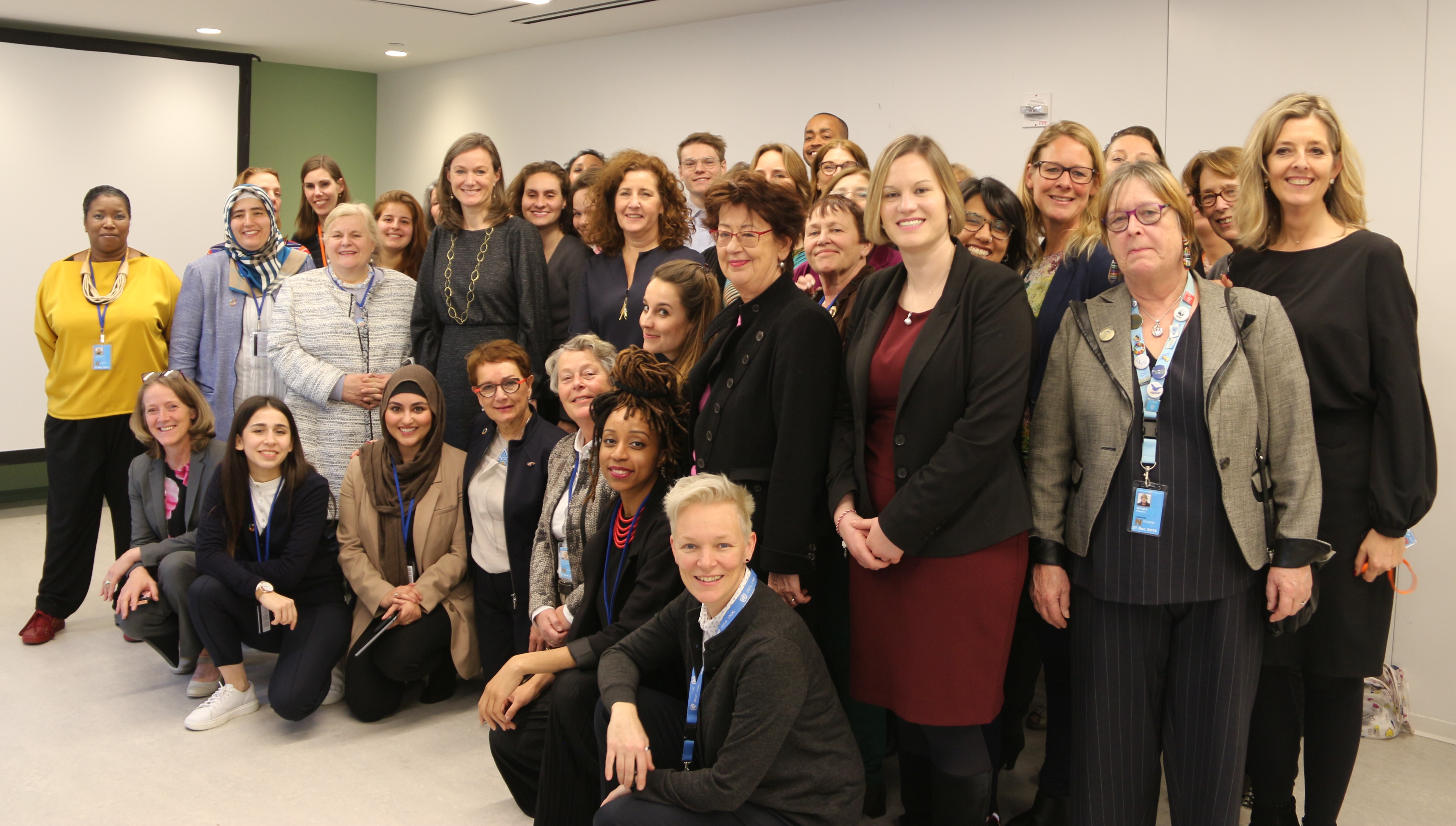
We also had a meeting with a large group of Dutch representatives including the Dutch minister of gender equality Ingrid van Engelshoven, she also gave a speech in the GA on behalf of the Kingdom of the Netherlands.
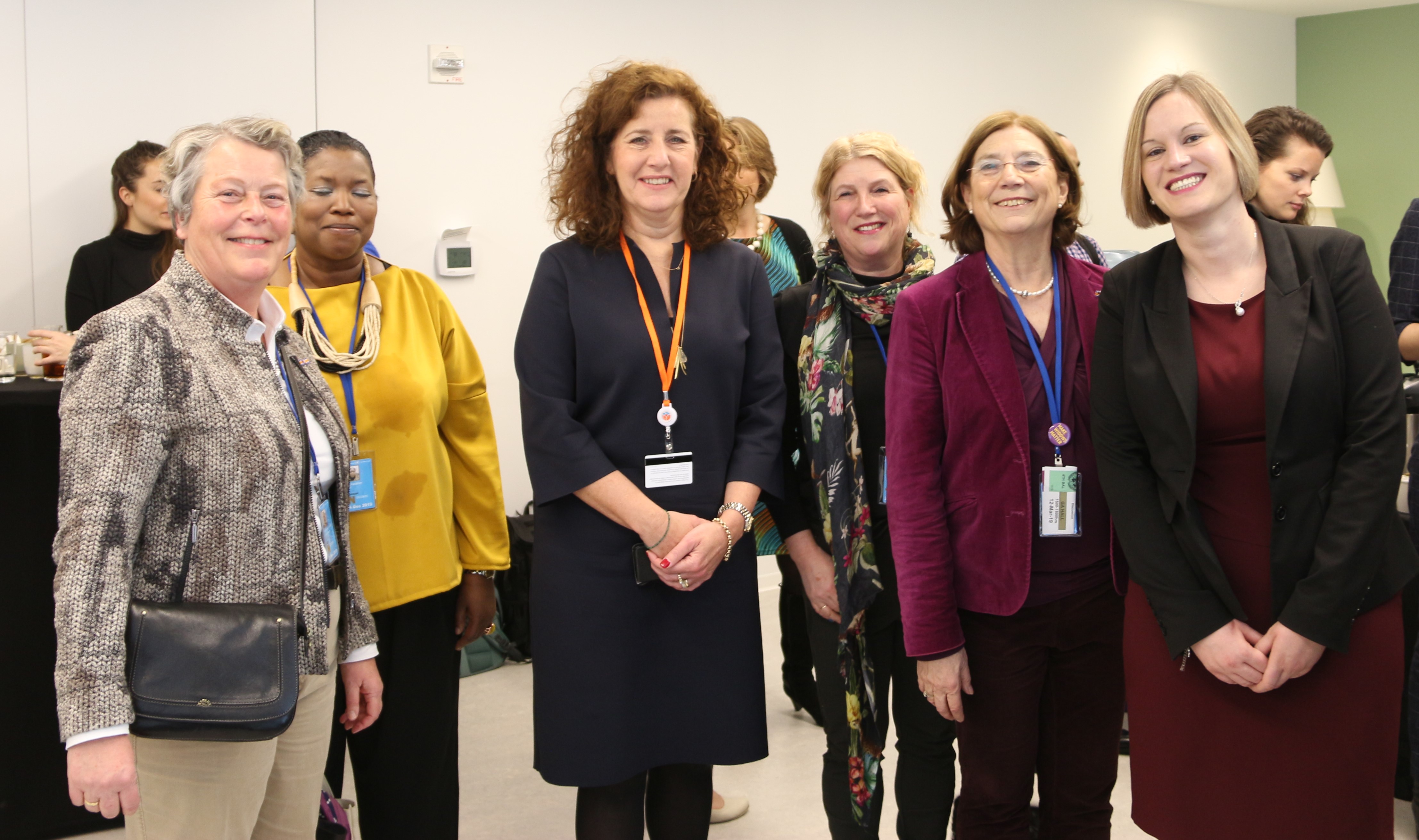
Another interesting event was about technology and education. Mrs. E.Focke-Bakker (Delft University) was one of the participators. She told us again what an enormous progress tech has given, but safety and security is essential for this development.
In universities we can see that students are easily connected and the young of today don’t always realise the importance of protection systems. They can study world wide with the MOOC’s (Massive open online courses) but good infrastructure for tech and affordable ICT is essential.

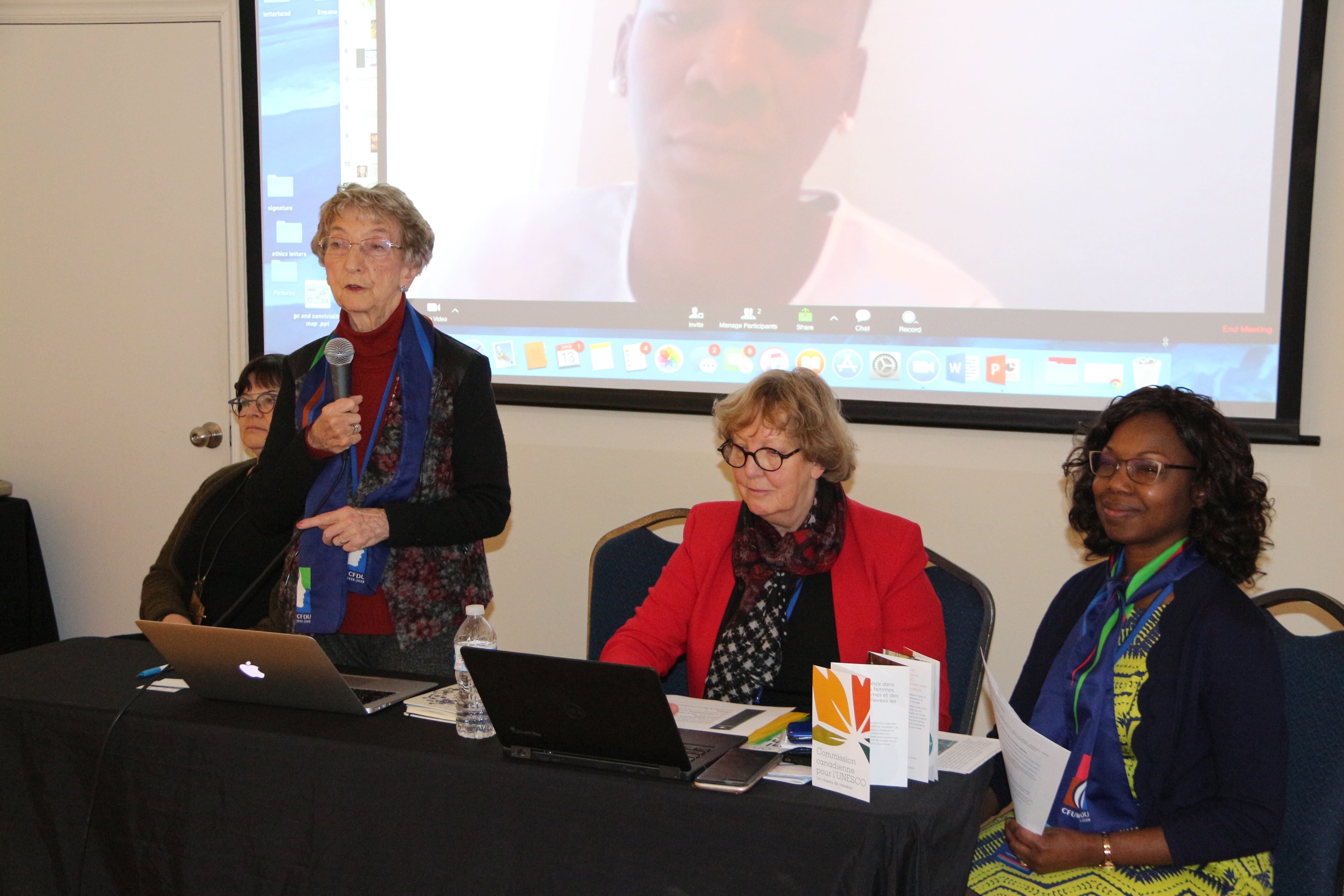
We must not forget that there are also people staying behind in this fast developing tech world. They need our special care. In the poorer countries the possibilities are enormous because of the tech development in education giving possibilities in their lives beyond school and they can study at home for their careers. Radio is also helpful if you can’t read or write.
Unfortunately we see cyberbullying and haressment, hate speeches and ID fraud as the new problems of the tech development. So there is a dark side to all the advantages.
Governments have to be aware and introduce new laws to protect users of the new ICT.
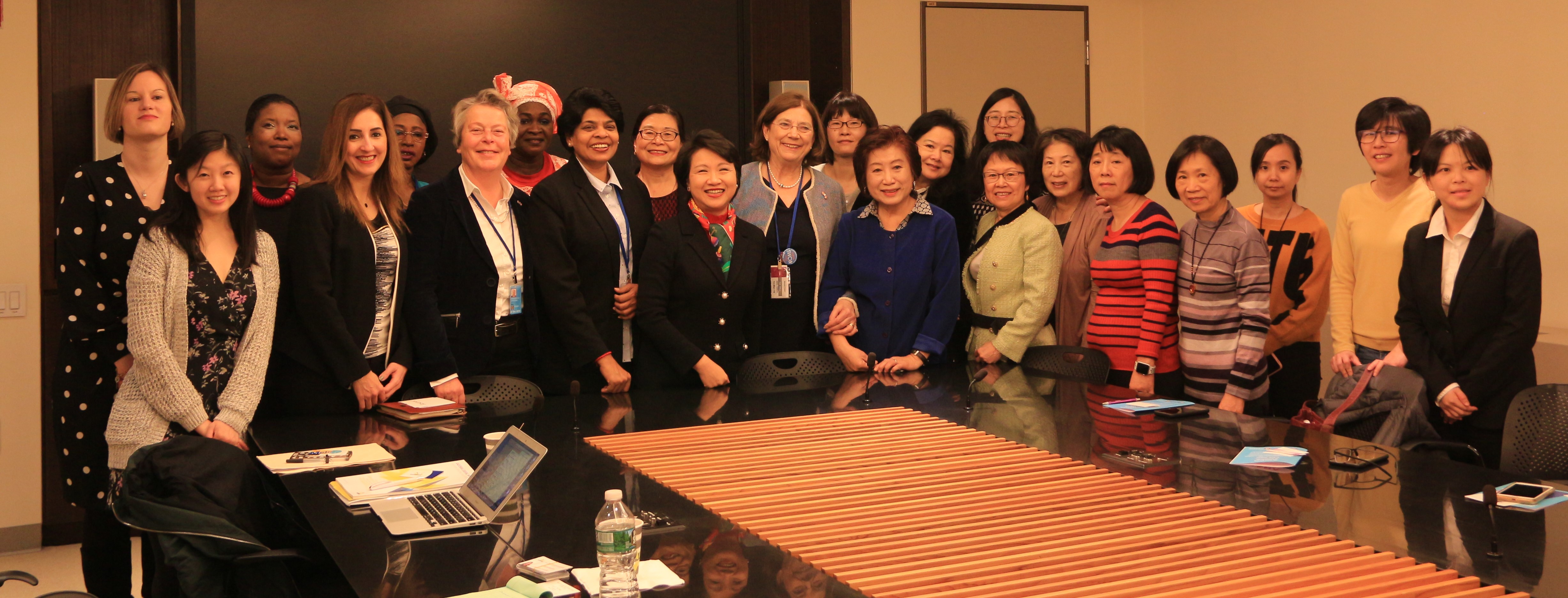
On the last day in our first week we arranged a very animated INLW meeting of INLW members with a group of ladies from Taiwan, Senegal and Mali. Many became a member of INLW.
We had our INLW side event with LI and Gender Women democracy on the Friday afternoon (seperate report).
The members of the INLW Board had a fruitfull meeting together with our new Board members and are looking forward to the next CSW march 2020.
At the closure of CSW63rd the agreed conclusions were accepted, a good result. You can download the report here.
Lysbeth van Valkenburg-Lely
Margaret de Vos van Steenwijk-Groeneveld
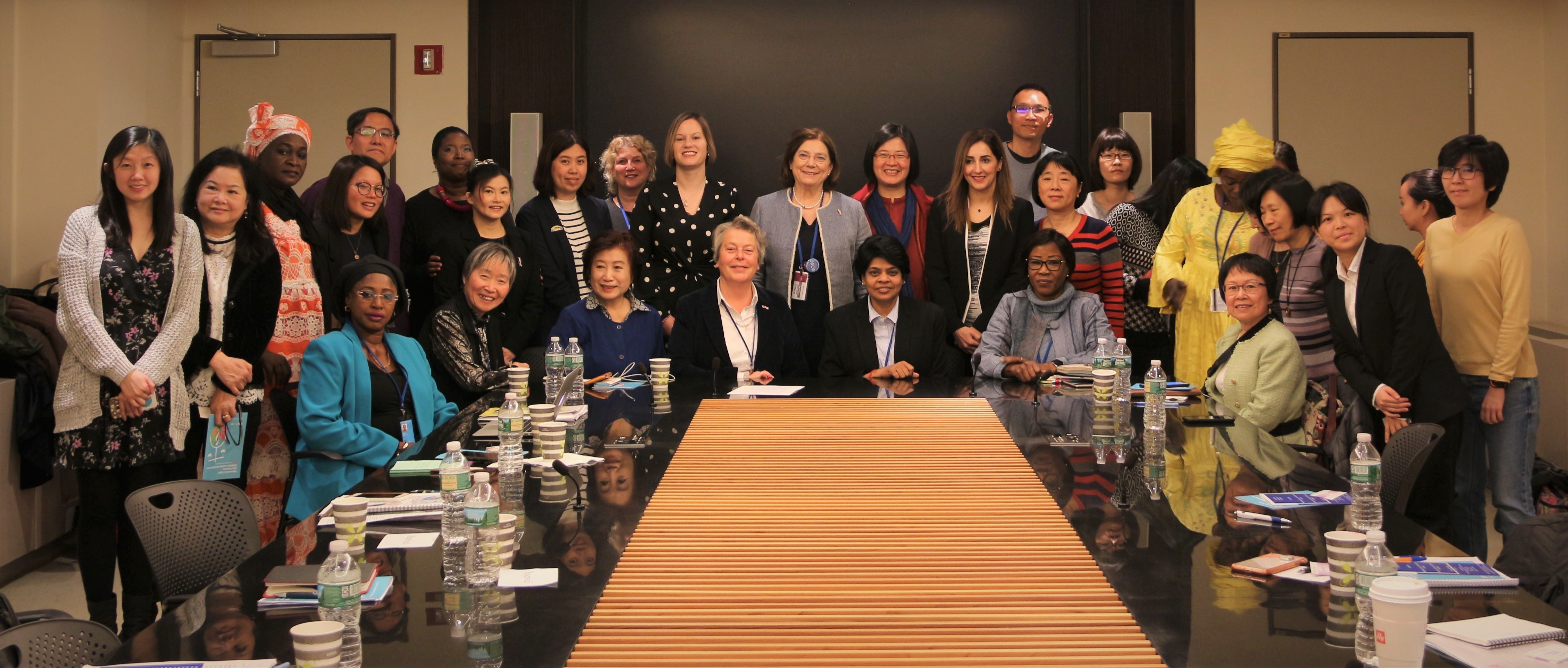
Download report
“Gov IDs My Number, So Track Me Maybe?”
4 W. 43rd St., The Blue Room
8:30 – 10:00 AM, March 11, 2019
Participants:
Noble Ackerson
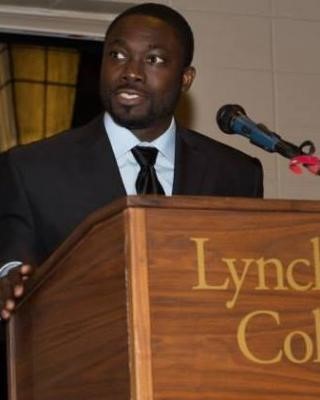 Senior Product Manager, Technology, NDI Noble is a Google Developers Expert for product strategy, international speaker on emerging tech, and a seasoned technical product lead delivering vision camera, web and mobile technologies from abstract concepts to final products. He led the award-winning DC-based Augmented Reality for fitness startup, LynxFit as Product Owner and Co-founder. Noble sits on the Alumni Leadership Board for the leading online educations startup Udacity. A member of the Alumni Board at his alma mater, Lynchburg College and acts as the Publicity Chair for Ubicomp and ISWC, two top-tier conferences for the internet of things and wearable technology.
Senior Product Manager, Technology, NDI Noble is a Google Developers Expert for product strategy, international speaker on emerging tech, and a seasoned technical product lead delivering vision camera, web and mobile technologies from abstract concepts to final products. He led the award-winning DC-based Augmented Reality for fitness startup, LynxFit as Product Owner and Co-founder. Noble sits on the Alumni Leadership Board for the leading online educations startup Udacity. A member of the Alumni Board at his alma mater, Lynchburg College and acts as the Publicity Chair for Ubicomp and ISWC, two top-tier conferences for the internet of things and wearable technology.
When Noble is not focused on product, he is mentoring underrepresented and aspiring founders, developers, speaking at technology events, or spending time with his daughters.
Thea Anderson
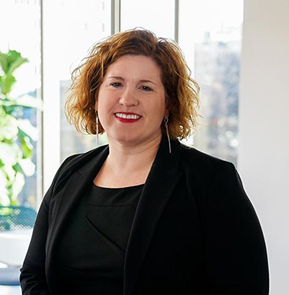 Director, Omidyar Network. Thea Anderson is a Director at Omidyar Network focused on digital identity and ethical technologies. Omidyar Network is a philanthropic investment firm that creates a more equitable economy, promotes responsible technology that improves lives, and harnesses the power of markets to catalyze economic and social change. Established in 2004 by eBay founder Pierre Omidyar and his wife Pam, Omidyar Network has invested more than $1.4 billion commercial companies and nonprofit organizations. For Omidyar Network, access to any ID is not sufficient, rather it must be Good ID, an identity that empowers and protects an individuals’ rights to privacy, security, and user-control in the digital world. Thea brings 18 years of experience to the firm as a development practitioner in inclusive economies, market development, and digital financial services with a focus on frontier and fragile markets. To learn more, visit www.omidyar.com, and follow on Twitter @omidyarnetwork #PositiveReturns
Director, Omidyar Network. Thea Anderson is a Director at Omidyar Network focused on digital identity and ethical technologies. Omidyar Network is a philanthropic investment firm that creates a more equitable economy, promotes responsible technology that improves lives, and harnesses the power of markets to catalyze economic and social change. Established in 2004 by eBay founder Pierre Omidyar and his wife Pam, Omidyar Network has invested more than $1.4 billion commercial companies and nonprofit organizations. For Omidyar Network, access to any ID is not sufficient, rather it must be Good ID, an identity that empowers and protects an individuals’ rights to privacy, security, and user-control in the digital world. Thea brings 18 years of experience to the firm as a development practitioner in inclusive economies, market development, and digital financial services with a focus on frontier and fragile markets. To learn more, visit www.omidyar.com, and follow on Twitter @omidyarnetwork #PositiveReturns
Hugo Novales
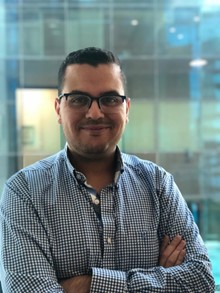 Regional Program Officer, NDI. Hugo Novales is a Guatemalan political scientist. He has conducted research on political parties and elections for NDI and the Asociación de Investigación y Estudios Sociales (ASIES). He teaches comparative politics and electoral systems at graduate and undergraduate level at two Guatemalan universities, and is currently a program officer at the NDI office in Guatemala, providing technical assistance to CSOs, political parties and public officials on matters related to political reform and elections.
Regional Program Officer, NDI. Hugo Novales is a Guatemalan political scientist. He has conducted research on political parties and elections for NDI and the Asociación de Investigación y Estudios Sociales (ASIES). He teaches comparative politics and electoral systems at graduate and undergraduate level at two Guatemalan universities, and is currently a program officer at the NDI office in Guatemala, providing technical assistance to CSOs, political parties and public officials on matters related to political reform and elections.
Lousewies Van Der Laan
She has just concluded a 3 year mandate as a Board Member of ICCAN: ICANN is a not-for-profit public-benefit corporation with participants from all over the world dedicated to keeping the Internet secure, stable and interoperable. It promotes competition and develops policy on the Internet’s unique identifiers. Through its coordination role of the Internet’s naming system, it does have an important impact on the expansion and evolution of the Internet. She is a former Member of the European Parliament where she served as vice-chairwoman of the Committee on Liberties and Civil Rights, Justice and Home Affairs between 2002 and 2003 and was a member on the Committee on the Rights of the Woman and Equal Chances between 1999 and 2003.
Sandra Pepera (Moderator)
Director for Gender, Women and Democracy, NDI
 INLW had the opportunity to fill in a Break Out Session on the important subject of Women and Climate Change. Hakima El Haité, Deputy President of Liberal International was one of the members in the discussion. The moderator Margaret de Vos van Steenwijk gave both speakers time to express their experiences on this vital theme.
INLW had the opportunity to fill in a Break Out Session on the important subject of Women and Climate Change. Hakima El Haité, Deputy President of Liberal International was one of the members in the discussion. The moderator Margaret de Vos van Steenwijk gave both speakers time to express their experiences on this vital theme.
Rama Toulaye Diallo Diouf from the Ministry of Environment of Senegal gave an insight in the way Senegal handles this combination. He confirmed that the gender issue should always be included when addressing Climate Change. Women are vital in the discussion and the solutions of this Climate Change problem. In Senegal one of the many problems is the large amount of salinated water. Local women have to solve the problem for the agriculture and the fisheries. A group of women has started under their own partnership their own farm. This can tackle the problems and is successful. In Senegal the” Plan d ’action 2019” is launched to better understand the gender in environment questions. Women can submit programs to the Ministry and most of these are taken up to be carried out. The main goal is to improve the living conditions of women, by helping them to grow vegetables and to farm in a more professionalized way. Also, they are becoming better business administrators and learn to market the products. After they have added value to the products, they can get higher prices for their products.
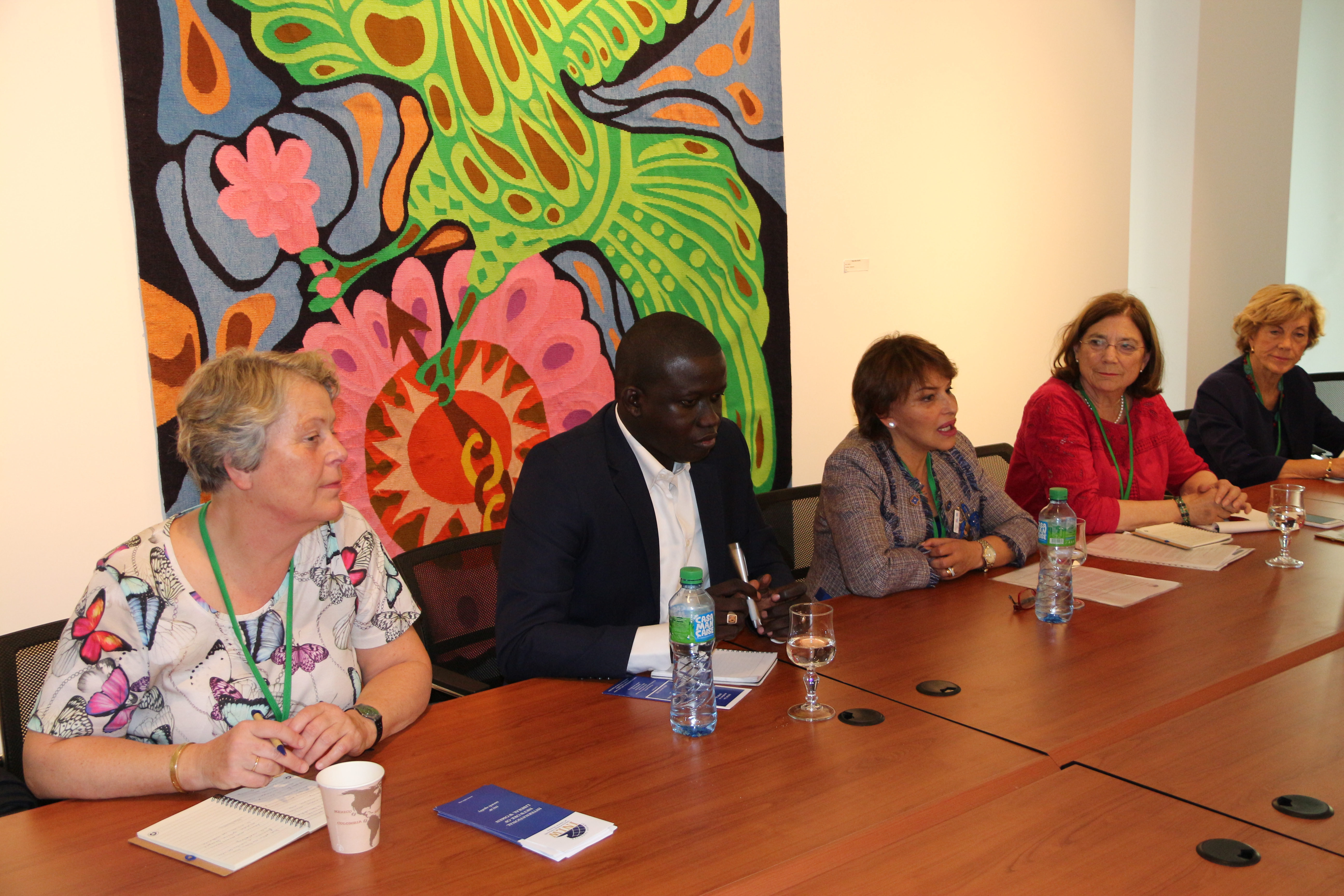 The government is also trying to make programs to involve more women in Parliament. Training programs are set up on many issues such as environment, entrepreneurship, agriculture, financial issues, administrative issues and marketing.
The government is also trying to make programs to involve more women in Parliament. Training programs are set up on many issues such as environment, entrepreneurship, agriculture, financial issues, administrative issues and marketing.
Women must gain their own independence and together with the Ministry they hope to improve the position of women. Hakima El Haité is glad to see that Senegal has acted after the COP 22 in Marrakech in 2017 by getting gender elements in all programs and politics. Unfortunately, although Hakima lobbied hard for gender in COP 22, there is no obligation to add gender in the country’s programs of countries which signed the agreement at COP 22. In Africa 90% of the women are having to deal with the problem of water for most of their time. The food insecurity is enormous while there is so much land, but 1,5 billion people have no access to water. Water is essential for food and for hygiene. Women are often responsible for the food security. By getting more women involved and giving them access to finance, capacity building, decision-making and negotiating positions the whole population will gain prosperity.
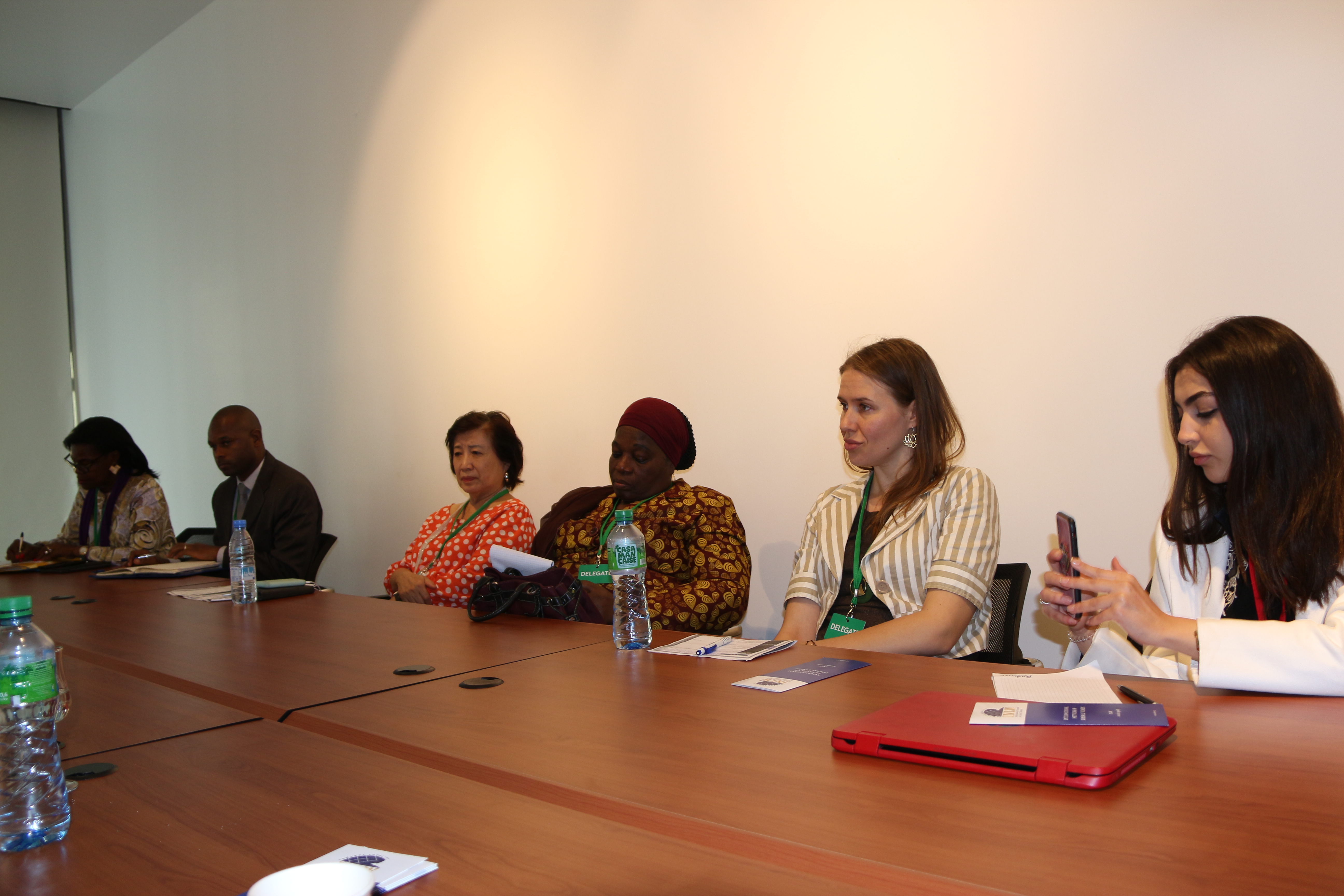 In Senegal women have no right to own land, while on the other hand they must take care of the children as well as providing for their food. They must get the opportunity to become entrepreneurs. It was typical that at the COP 22 agreement there were only men present!
In Senegal women have no right to own land, while on the other hand they must take care of the children as well as providing for their food. They must get the opportunity to become entrepreneurs. It was typical that at the COP 22 agreement there were only men present!
Both speakers spoke out their appreciation for the resolution of INLW on Women and Climate Change and hoped that LI and other parties will add their support to fight for an action plan with enough available money and gender issues high on the agenda in many different partner countries in Africa.
Hakima El Haité has set up a new program “For Women in Africa” with other partners to get money for new projects to help women as much as possible. It is important to help women to heighten the security of their families and to stop the migration as a result of terrorism. One of the important projects is lighting the roads. Enough light gives women more security and thus freedom to go anywhere on their own. Another project is that in Morocco solar panels help solving water problems. As the sun is always available in Africa, the sun can give many more solutions in Africa.
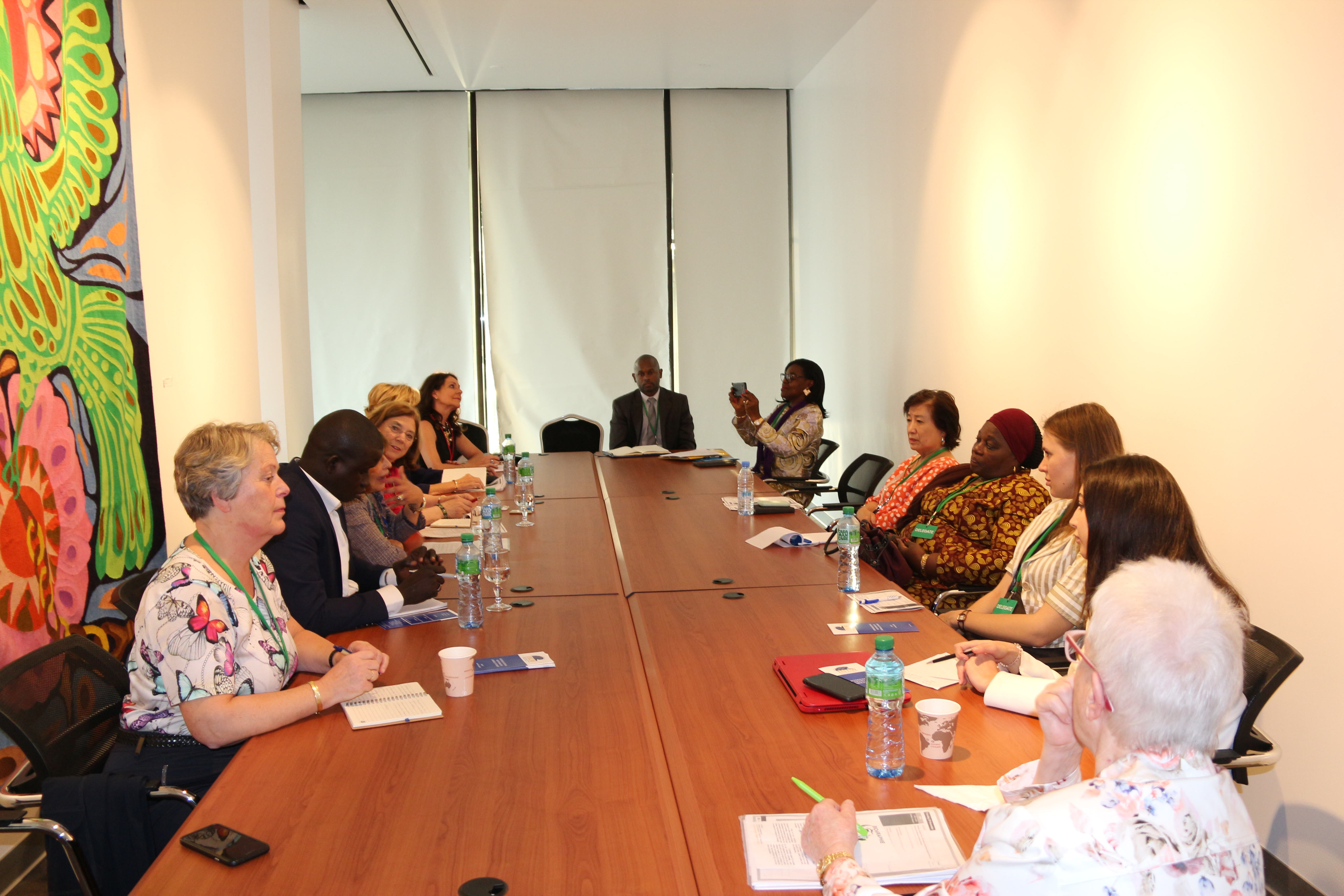 A very important project is education for girls and women. In many parts of Africa education is still not compulsory for girls. In the Cote d’Ivoire education is compulsory for all children from the age of 6. Still girls in the countryside must be stimulated to go to school, the distance is often far, and it is not very safe to travel.
A very important project is education for girls and women. In many parts of Africa education is still not compulsory for girls. In the Cote d’Ivoire education is compulsory for all children from the age of 6. Still girls in the countryside must be stimulated to go to school, the distance is often far, and it is not very safe to travel.
Both speakers are hopeful of the possibilities and new developments that are seen all over the world and are confident that Africa will become an important part of the world in the future. A lively discussion followed with examples given of the good, bad and hopeful developments in different parts of the world. The time was too short to go into more detail.
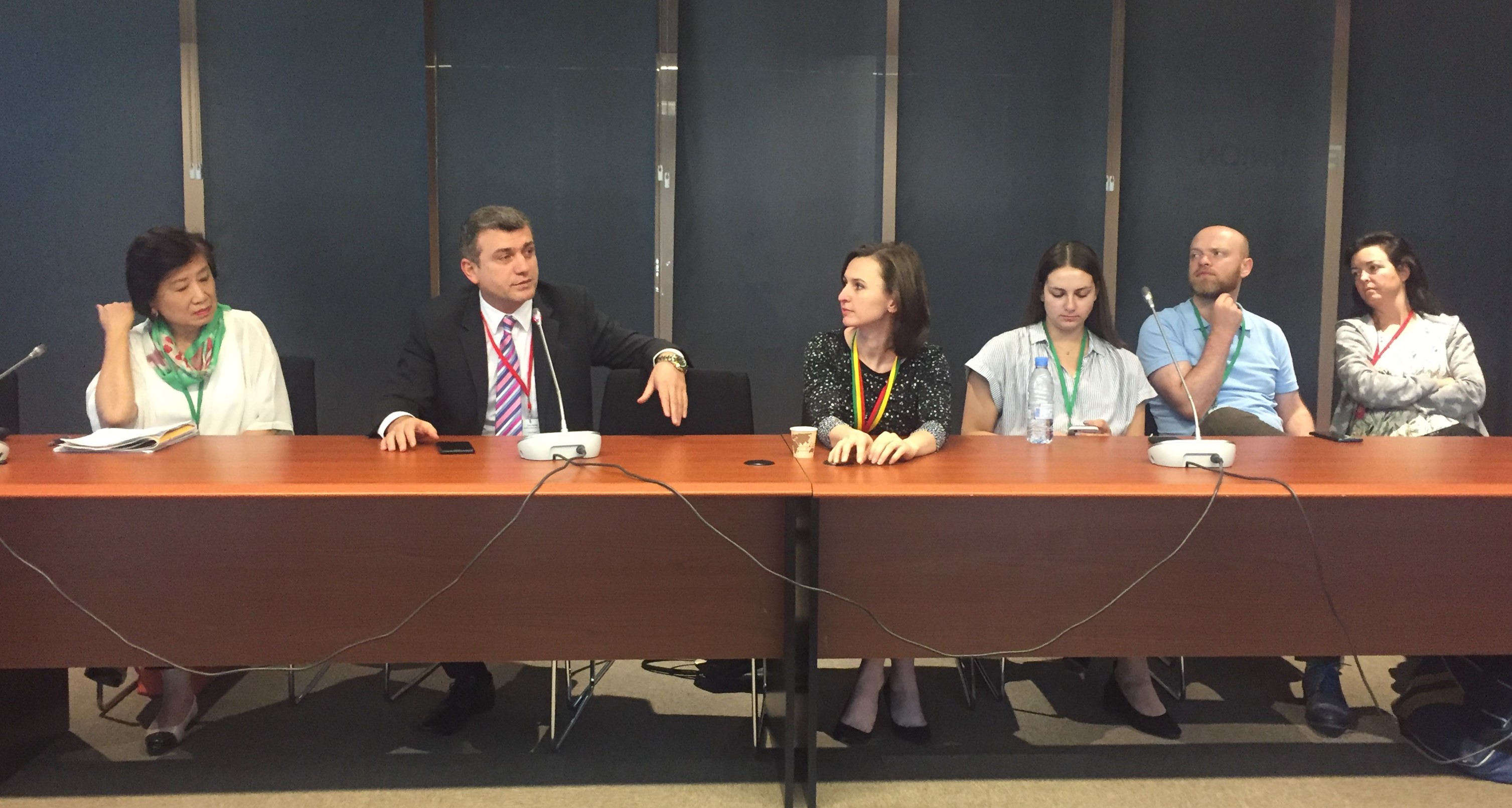 Dhouba Debaya from Tunisia gave us some important challenges for his country. First, the law must be changed in order to get a better position for women. One of the privileges that has recently been demolished is the law on polygamy. Through all the pressure of many women and political parties it is now abolished. A good operating political party can lead a country into a civil society.
Dhouba Debaya from Tunisia gave us some important challenges for his country. First, the law must be changed in order to get a better position for women. One of the privileges that has recently been demolished is the law on polygamy. Through all the pressure of many women and political parties it is now abolished. A good operating political party can lead a country into a civil society.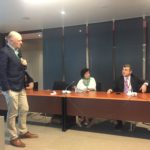
The moderator was Boris van der Ham, LI HRC member.
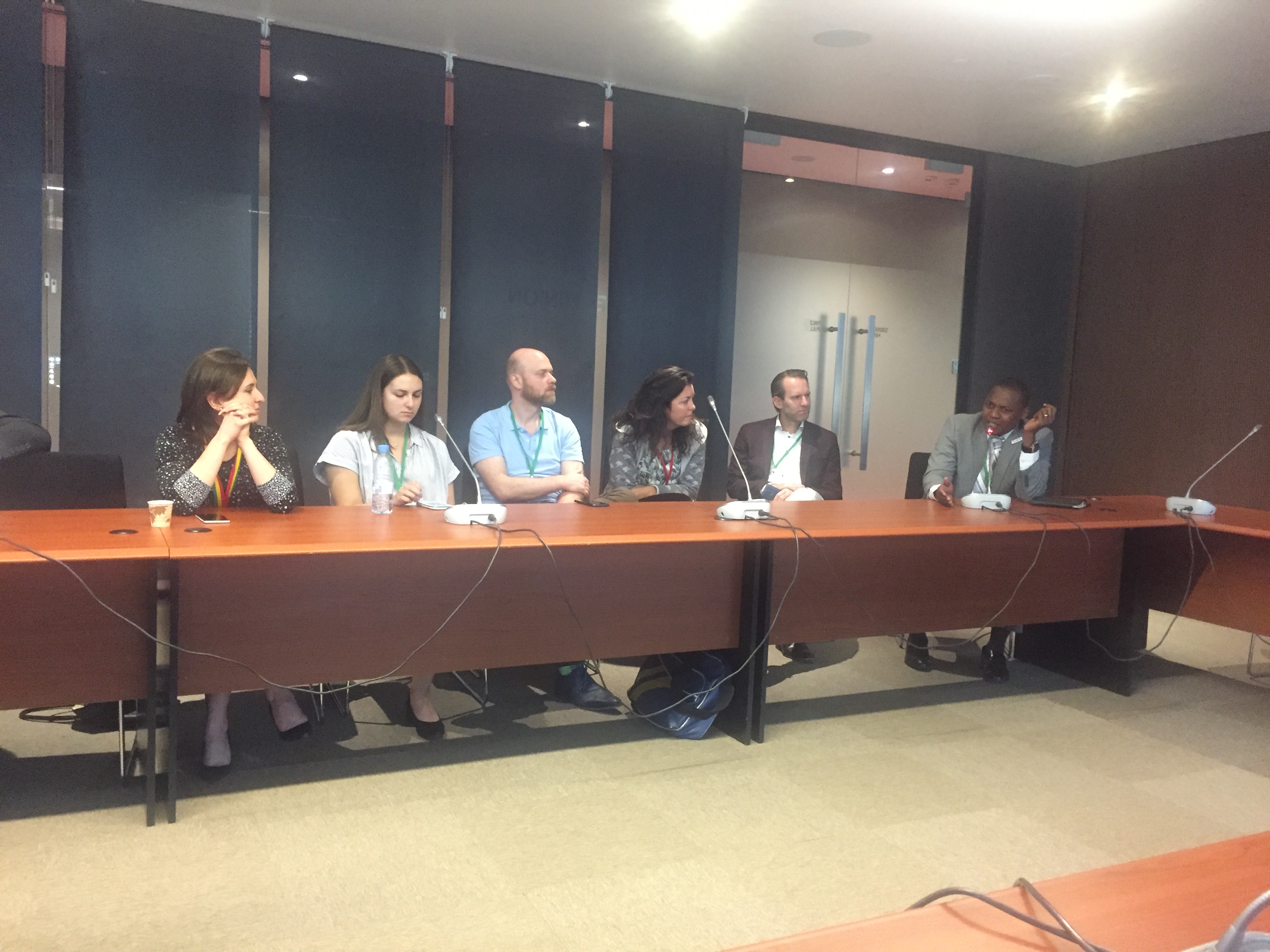 Educating more women and giving them positions in politics helps to improve this whole aspect. In many African countries more women than men are voting during elections, but often they don’t vote for other women but for men. This also needs education from other women and emphasis on the importance to support your own gender as much as you can if you want to see more women in important positions.
Educating more women and giving them positions in politics helps to improve this whole aspect. In many African countries more women than men are voting during elections, but often they don’t vote for other women but for men. This also needs education from other women and emphasis on the importance to support your own gender as much as you can if you want to see more women in important positions.Overall there is progress in the region but there is still a lot to be done. Very often the results are small but still any progress is better than none and is the conclusion of the discussion was that we can see that we are not losing ground.
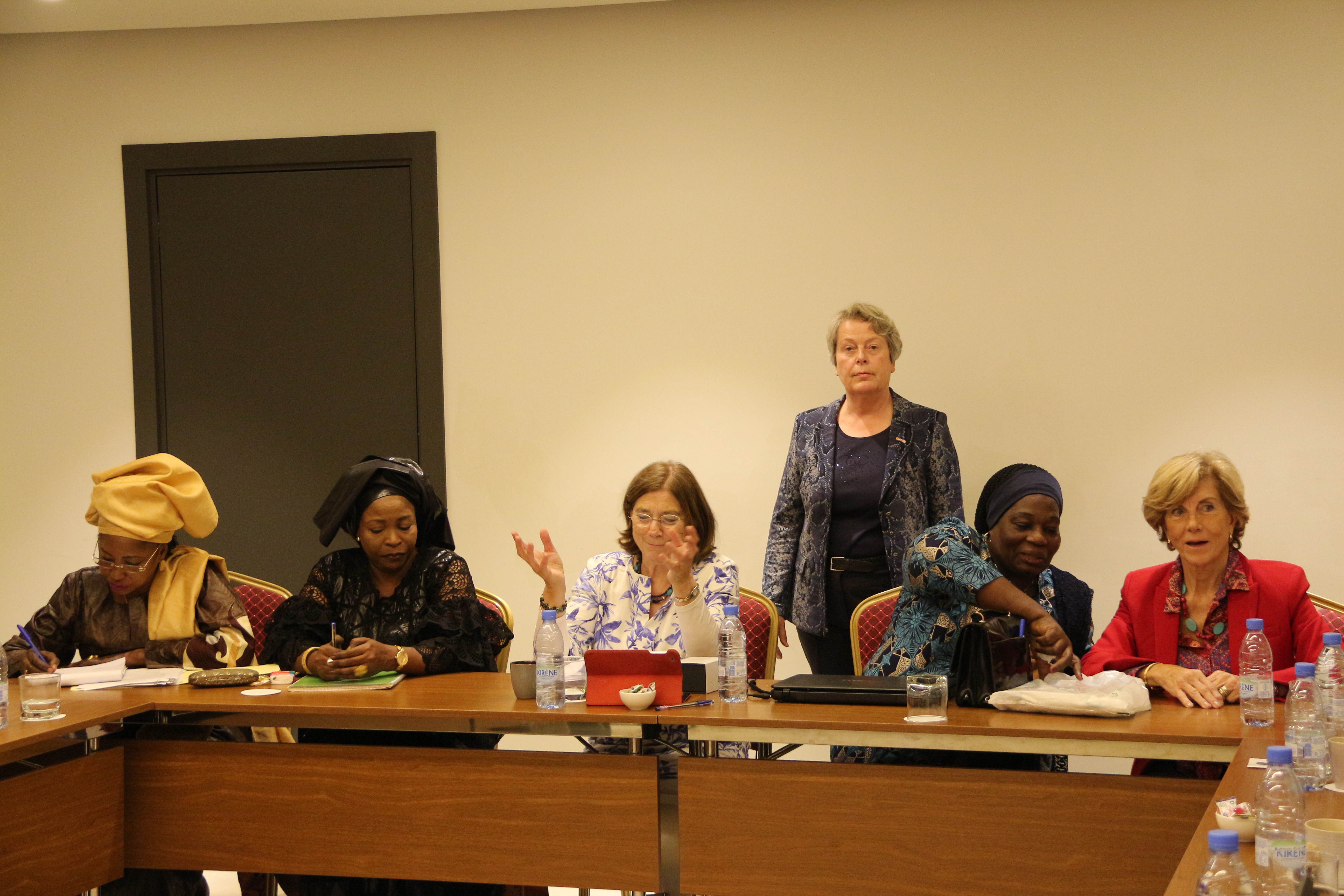 After our Board Meeting in Dakar, Senegal, we received 15 ladies from Senegal and Ivory Coast to give them information about INLW and how they can become a member and participate in our continuous effort to get more women in Politics and decision-making positions.
After our Board Meeting in Dakar, Senegal, we received 15 ladies from Senegal and Ivory Coast to give them information about INLW and how they can become a member and participate in our continuous effort to get more women in Politics and decision-making positions.
The platform that will be formed in this part of Africa will constitute of members from Senegal, Mali and Cote d’Ivoire. The Friedrich Neumann Stiftung will help organize events and be able to give training for women who are interested in a political career.
 In all these countries it is very difficult for women to get any important leading position. Unfortunately, we notice that women do not always support other women. That is seen in many countries. It is sad to say that women tend to have more criticism about their own sisters in good positions than about men.
In all these countries it is very difficult for women to get any important leading position. Unfortunately, we notice that women do not always support other women. That is seen in many countries. It is sad to say that women tend to have more criticism about their own sisters in good positions than about men.
This group of women are going to form a sort of INLW Chapter: “West African Liberal Women”.

In Senegal there are 50% women in Parliament but that is achieved by an agreement between the parties and the president. This is not the case in the Côte d’Ivoire or Mali.
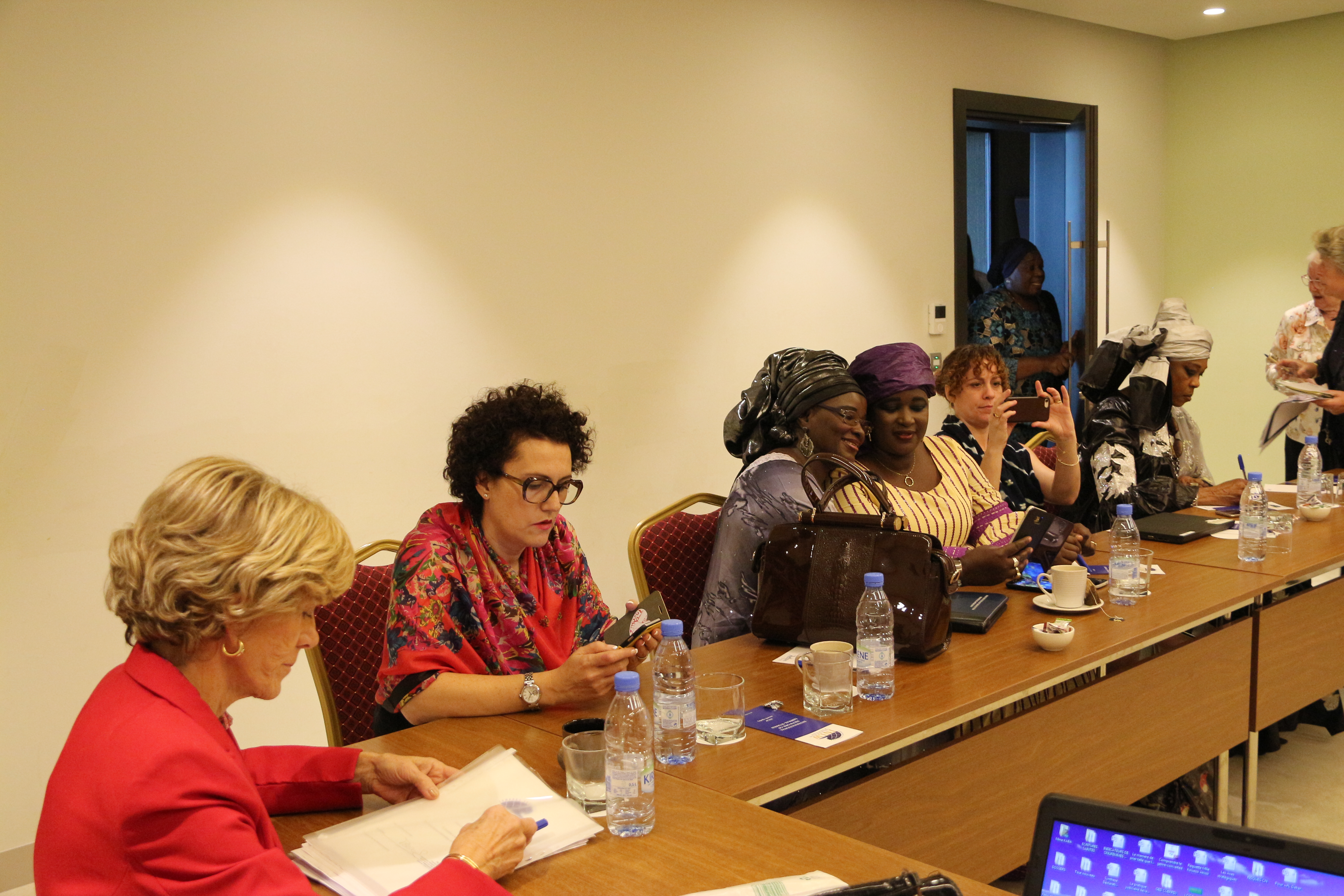 The meeting was an agreeable highlight for us at the congress and in the mean time 18 ladies have become members. The representative of this part of Africa, Awa Gueye Kebe, is actively acquiring new members and has agreed to become one of our vice-presidents in Africa in the INLW Board.
The meeting was an agreeable highlight for us at the congress and in the mean time 18 ladies have become members. The representative of this part of Africa, Awa Gueye Kebe, is actively acquiring new members and has agreed to become one of our vice-presidents in Africa in the INLW Board.
 In the evening many of our new friends were present during the African Dinner & Freedom speech.
In the evening many of our new friends were present during the African Dinner & Freedom speech.
We are looking forward to seeing some of the new members during the next CSW in March 2019 in New York.
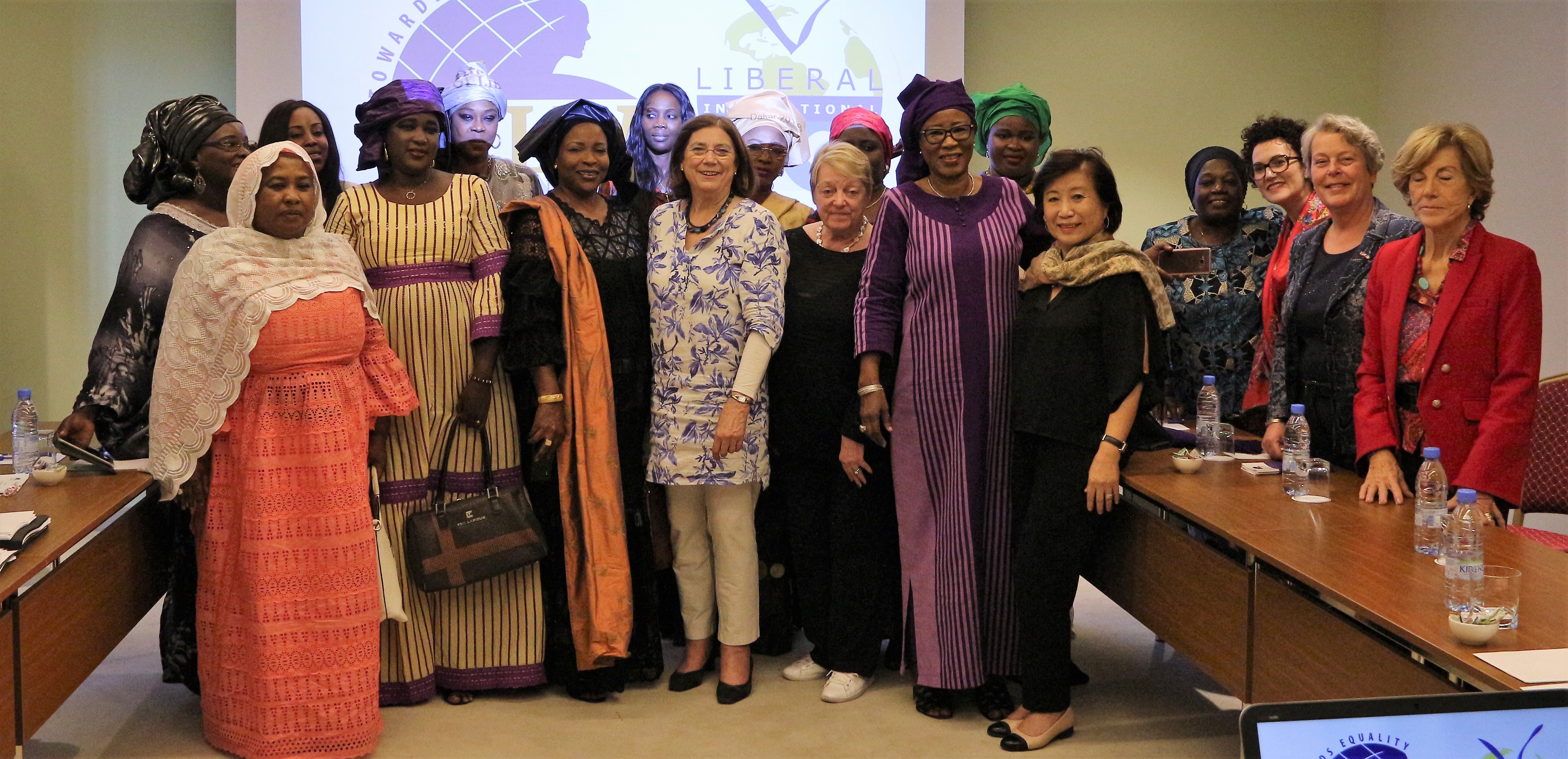 Download as pdf
Download as pdf
Members of INLW Netherlands Chapter participated in writing the so-called “NGO shadow report concerning the NL Government report to the CEDAW Committee.
INLW was a co-signer of the NGO Shadow report
This shadow report has been compiled on behalf of the Dutch CEDAW Network by a team consisting of some NGOs and independent women’s rights experts in the Netherlands. In mid-November 2018 the Dutch CEDAW Network learned through the website of CEDAW/OHCHR that the follow-up report had been submitted by the government of the Netherlands. As a response to that the Dutch CEDAW Network started a consultation process with NGOs and CSOs. On 27 November 2018 it convened a meeting to discuss the government’s follow-up report. Other experts from NGOs, CSOs and expert institutions such as Movisie – knowledge and approach of social issues also lent their expertise through written submissions.
Link to report
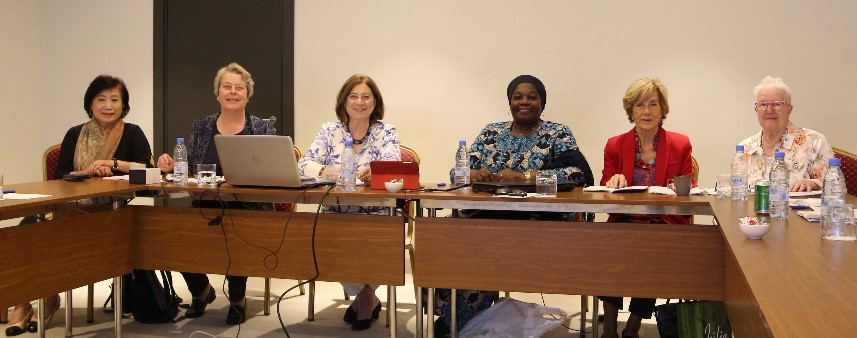
During the General Meeting in Dakar, Senegal, the election and appointment took place of several (new) members of the INLW Board. The Board has also decided to install a Consultative Committee, acoording to art. 4.5 of the INLW Constitution.
Several members were present during the GM. There was a warm welcome for the New President, Jayanthi Devi Balaguru who was unable to be present herself because of her work obligations. She hopes to meet members in New York during the CSW in March.
Words of thanks were especially spoken to Margaret de Vos van Steenwijk, president of INLW during two terms. She gave a lot of energy, time, wisdom, enthousiasm and friendship to all members during those years. We all thank her and hope for her support in her new position as immediate Past President.
Here you find the new formation of the Board and also the group of members who were appointed as members of the Consultative Committee.
INLW MANAGEMENT BOARD
APPOINTED IN THE GENERAL MEETING IN DAKAR 2018
| President: | Jayanthi Devi Balaguru |
| Immediate Past President: | Margaret de Vos van Steenwijk |
| Deputy President: | Khadija El Morabit |
| Secretary General: | Mireia Huerte Sala |
| Treasurer: | Lysbeth van Valkenburg |
| Vice-president Europe: | Sal Brinton |
| Vice President Asia: | Maysing Yang |
| Vice President Mena: | Loubna Amhair |
| Vice President Africa: | nominated Awa Gueye Kebe |
| Vice President Latin America: | Patricia Olamendi |
| Member general affairs: | Leticia Gutíerrez |
| Member general affairs: | Ruth Richardson |
CONSULTATIVE COMMITTEE of INLW
Installed in Dakar, Senegal during the General Meeting of
The Interantional Network of Liberal Women
according to art. 4.5 of the INLW Constitution
Joaquima Alemany Roca, Spain
Marianne Kallen, The Netherlands
Denise Robinson, South Africa
Silvia Flury, Spain
Yaya Fanta Kaba Fofana, Ivory Coast
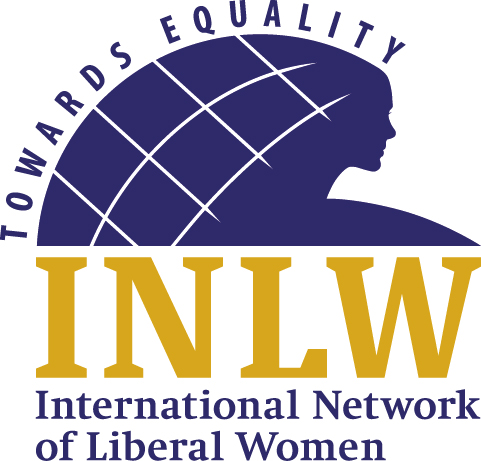
 Visit our Facebook page
Visit our Facebook page